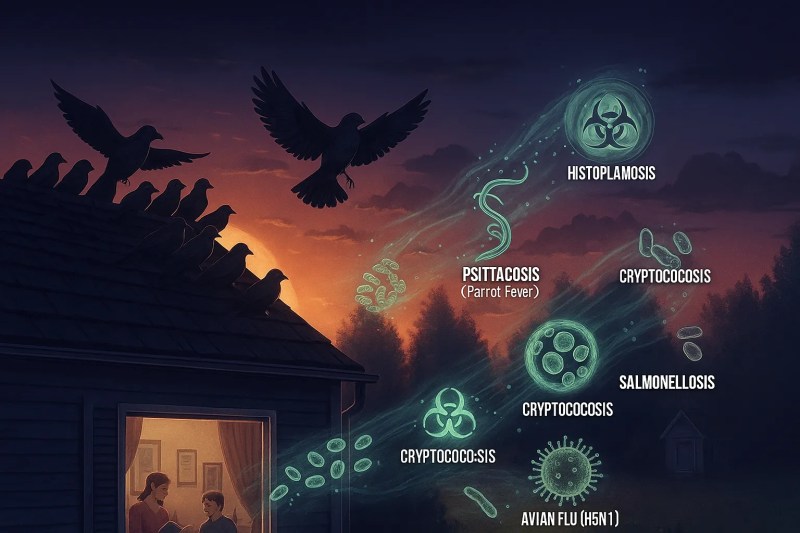
Bird Disease (Image: AI)
Bird Diseases Prevention Tips: Birds make the world around us more beautiful with their chirping and flight, bringing life to our homes and courtyards. However, few people are aware that some common birds living near our homes or cities, such as pigeons or sparrows, can sometimes spread diseases. From pigeons perched on rooftops to sparrows nesting in attics, these birds unknowingly spread certain germs that can harm humans.
Therefore, it is important to be aware of this, maintain cleanliness in our surroundings, carefully clean bird droppings or nests, and seek medical advice if necessary. This way, you can enjoy birds while also taking care of your health.
Psittacosis, also known as parrot fever, is a bacterial infection that can spread to humans through the droppings, feathers, or nasal secretions of infected birds, particularly parrots, parakeets, and cockatiels.
In humans, symptoms can include fever, chills, fatigue, and pneumonia. While it is treatable with antibiotics, it is better to prevent it. If you own pet parrots, maintain proper hygiene and avoid touching wild birds without protection.
Histoplasmosis is a fungal infection associated with the droppings of birds like pigeons and starlings. This fungus thrives in soil contaminated with droppings and becomes airborne, posing a risk of infection to humans through inhalation.
Its symptoms can range from mild flu-like symptoms to severe respiratory problems. Individuals with weakened immune systems are particularly at risk. Keeping areas clean and preventing the accumulation of bird droppings in attics, rooftops, and courtyards can help prevent infection.
Salmonella is not just a foodborne pathogen; it can also come from birds. Backyard chickens, wild sparrows, pigeons, and doves can carry Salmonella bacteria, which can contaminate surfaces, food, or water sources.
In humans, it can cause diarrhoea, fever, abdominal cramps, and vomiting. Basic hygiene, washing hands after touching birds, and keeping poultry coops clean are essential to reduce the risk.
Avian influenza, or bird flu, is a viral infection spread by wild waterfowl and domestic poultry. Direct contact with infected birds or their droppings can cause flu-like symptoms in humans.
Health authorities advise avoiding contact with sick birds, wearing protective gear, and staying informed about outbreaks in your area.
Pigeons, commonly found in American cities, can carry a fungus called Cryptococcus, which thrives in their droppings. Humans can inhale its spores, leading to respiratory problems, headaches, and in severe cases, meningitis.
Cleaning pigeon droppings with protective equipment and avoiding areas heavily affected by pigeons are the best preventive measures.
Birds such as seagulls, sparrows, and pigeons can carry bacteria like E. coli and Campylobacter. These pathogens can contaminate water, soil, or food surfaces, leading to gastrointestinal illnesses in humans.
Simple measures like covering food, cleaning bird feeders, and avoiding areas contaminated by birds are effective preventive steps.
Even if birds are not spreading infectious diseases, their feathers, droppings, and dander can cause allergies or worsen asthma. Regular cleaning, using HEPA filters indoors, and keeping bird nests away from living spaces can reduce the risks.
Maintain a Safe Distance: Avoid direct contact with wild birds and their droppings.
Clean Safely: Wear gloves and a mask when cleaning areas with bird droppings.
Care for Your Yard: Remove old nests from attics, balconies, and rooftops.
Protect Your Pets: Birds can also transmit infections to cats and dogs.
Practice Good Hygiene: Wash hands thoroughly after touching birds or cleaning feeders.
Use Bird-Proofing Measures: Nets, screens, and deterrents can keep birds away from high-traffic areas.
Disclaimer: The information provided in this article is for awareness purposes only and does not substitute for medical advice. Readers are advised to consult an expert or doctor before adopting any medication or treatment.
Published on:
13 Oct 2025 01:44 pm
Big News
View AllHealth
Trending
Lifestyle

